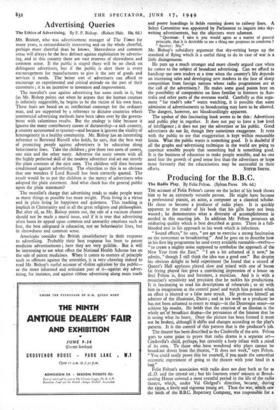Advertising Queries
The Ethics of Advertising. By F. P. Bishop. (Robert Hale. 10s. 6d.) MR. BISHOP, who was advertisement manager of The Times for many years, is extraordinarily interesting and on the whole cheerful, perhaps more cheerful than he knows. Shrewdness and common sense will always be the best defence against exploitation by advertis- ing, and in this country there are vast reserves of shrewdness and common sense. If the public is stupid there will be no check on delinquent advertisers, but if the public is alert there is every encouragement for manufacturers to give it the sort of goods and services it needs. The better sort of advertisers can afford to encourage an experimental and critical attitude on the part of their customers ; it is an incentive to invention and improvement.
The moralist's case against advertising has some truth in it, but (as Mr. Bishop points out when he argues that the human creature is infinitely suggestible, he begins to be the victim of his own fears. These fears are based on an intellectual contempt for the ordinary man, and are supported by a reference to dictator countries where 'Commercial advertising methods have been taken over by the govern- ment with calamitous results. But the analogy is false because it ignores the many contributory causes of dictatorship—a sick country, country accustomed to tyranny—and because it ignores the vitality of heterogeneity in a healthy community. Mr. Bishop has an interesting reference to Bertrand Russell who holds, he says, that the best way of protecting people against advertisers is by education along behaviourist lines. Take the children ; give them two sorts of sweets, one nice and the other nasty. Advertise the nasty sweets with all the highly perfected skill of the modern 'advertiser and set out merely the plain contents of the nice ones. The children will then become conditioned against advertising. The objection to this is so obvious that one wonders if Lord Russell has been correctly quoted. The result would be to put the children at the mercy of advertisers who adopted the plain statement. And what check has the general public upon the plain statement?
The moralist's charge that advertising tends to make people want as many things as possible has more weight. Plain living is a virtue and in plain living lie happiness and quietness. This teaching is implicit in Christianity and in all the great religions and philosophies. But after all, as Mr. Bishop points out, the sale of a vacuum cleaner should not be made a moral issue, and if it is true that advertising often bases its appeal upon common and unworthy emotions such as fear, the -beit.. safeguard:is education; nbt on liehaviotirist lines, but in shrewdness and common sense. • - •
AmeriCafis -con.sider the British unsadifactOrY in their response to advertising. Probably their nest resPOnSe has. been to patent medicine advertisements-; here they arc very gullible. • But it will be interesting to see what effect the National Health Scheme has on the sale of patent medicines. When it comes tb matters of principle such as offences against the 'amenities, it is very,cheering indeed to read Mr. Bishop's rueful account -of-violent agitation tiY-the public— or the more informed and articulate part of it-against sky adver- tising, for instance, and against ribbon advertising along main roads
and poster hoardings in fields running down to- railway lines. A Select Committee was appointed by Parliament to inquire into sky- writing advertisement, but the objectors were -adamant.
" Question: I take it you would agree as a matter of general principle, that it is desirable to see a thing one proposes to condemn ? " Answer : No."
Mr. Bishop's subsidiary argument that sky-writing keeps up the standard of flying which is a useful thing to do in case of war is a little disingenuous.
He puts up a much stronger and more closely argued case when he comes to the subject of broadcast advertising. Can we afford to handicap our own traders at a time when the country's life depends on increasing sales and developing new markets in the face of sharp competition from foreign nations whose radio programmes are at the call of the advertisert? He makes some good points here on the possibility of compromise on lines familiar to listeners in Aus- tralia and other parts of the overseas world. Carefully as this argu- ment " for trade's sake " wants watching, it is possible that some admission of advertisements to broadcasting may have to be allowed. The dangers, however, are bloodcurdlingly apparent The upshot of this fascinating book seems to be this : Advertisers and public play in together. It does not pay to have a low level of intelligence ; it does not pay the advertiser or his public. Good advertisers do not Ile, though they sometimes exaggerate. It rests with the public to see that exaggeration is kept within reasonable limits. What the public wants is something good. It is doubtful If all the graphs and-'advertising technique in the world are going to convince sensible people that something bad is something good. It is the business of education to make people sensible, and no one need fear the growth of good sense less than the advertisers or hope more fervently that the educationists may be successful in their






































 Previous page
Previous page